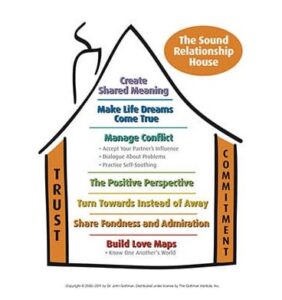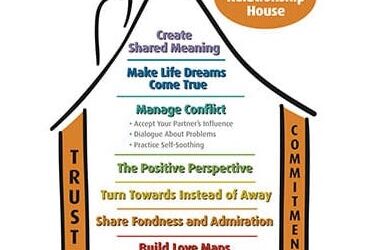
Get to know each aspect of Gottman’s Sound Relationship House and make sure you have and maintain them in your relationship.
Every Marriage and Family Therapist is familiar with Dr. John Gottman’s theory of the Sound Relationship House, the seven things that fortify a relationship and make a marriage strong. Gottman has done so much research on what makes great marriages and what predicts divorce, by studying, testing and interviewing thousands of couples over many decades, that therapists know it’s extremely worthwhile and teach it to clients routinely.
When it comes to questions a person should be able to answer about their partner before getting married, it’s wise to look at the foundation issue of the Sound Marital House, which Gottman calls, Building Love Maps. This involves being curious and knowledgeable about the history, hopes, desires and interests of your partner. I often tell clients that if you’re successful at building love maps, you would be able to take a multiple-choice test about your partner’s life, hopes and dreams, and you’d get a high score. The way we get there is by being curious, asking questions, listening and absorbing. If you’re truly interested in who your partner is and where they’ve been and where they want to go, this should not be difficult.
We date a person to figure out if they are right for us, but a relationship won’t have legs to weather storms until the couple solidly bonds over time. The bonds will be the healthy foundation on which the relationship stands. Bonds are built by building love maps through many conversations and experiences together. These conversations and experiences lead to mutual admiration and affection. Now we have enough stock in the relationship to be able to weather the inevitable bumps and potholes that come with long term relationships. Once the foundation is formed and the bonds built, you must continue building love maps as people will change and grow in a multitude of ways.
I do have to mention difficulties you may encounter, however. I have always been a curious and interested person, and when I started dating my children’s dad years ago, I’d ask him about his life, past girlfriends, what life was like on his dad’s farm, “Hey, what was your former stepmother like?” His response: “I don’t want to talk about it.” He avoided any conversation about his life for all the years we were together, and what I did learn his sister told me. I was not a therapist then, and I wrote it off as, “He must be a private person,” and I respected that.
I wasn’t a counselor then, but if I was, I would have seen his closed-off behavior as a huge red flag. I would have known this is a man who won’t let me know who he is, who only reveals the parts of himself he chooses for me to see. There will not be emotional intimacy and deep connection because he won’t allow it. Although in the beginning of the relationship he took his wall down long enough for me to fall in love, he soon slammed the door shut and would never open it again. I had been seduced into the relationship, then left standing by myself. This pattern is not unusual in relationships.
These sorts of experiences are how we learn about life and people, and I learned a lot from that. Our eventual divorce led me to seek answers about what went wrong, what does a healthy relationship look like, because I never wanted to go through an experience like that again. That is how I ended up becoming a Marriage and Family Therapist, so all that experience and education has taught me that what Gottman writes about is true and worth knowing. It also helped me to understand what needed to be present if I was ever to have a healthy relationship.
I do have a healthy relationship today, and this knowledge is a vital part of that. If I was back in the dating scene the things I’d need to know before committing for a life-long relationship would be:
- If you become disillusioned with our relationship and the feeling lingers, will you tell speak up so we can address it right away?
- If we get into trouble we can’t resolve, will you go with me to get professional help?
- Will you work hard to bring your best self to the marriage?
- Will you be open and transparent to me, and show up as your true self?
- Will you be my best friend, and put our relationship first, above your biological family and our children?
- Will you be loyal and dependable? Will you be there for me?
- Will you read The Five Love Languages by Gary Chapman, learn my Love Languages and fill my needs in these areas on an ongoing basis?
- Will you be balanced in the time you spend on your career, hobbies, family, friends, making sure that our relationship has been fed and nourished as a priority before filling up free time with other interests?
This list may be eye-opening and seem like a lot, and it’s meant to be. We often hear that having a good marriage takes a lot of work, and these things are part of the work that is involved. Work is a verb and implies action. Good marriages take lots of action. As I go down the list, I am also keeping in mind the things couples who come see me complain about. They wouldn’t have most of these complaints if they were working on these very important areas in the relationship. The bottom line is, marriage is for big boys and girls, who are able to stay aware, mindful and tuned in to themselves and their partners. When there’s an issue, they take care of it immediately.

 Becky Whetstone is an Arkansas native and has a Ph.D. in Marriage and Family Therapy from St. Mary’s University in San Antonio, Texas. She is a Licensed Marriage and Family Therapist (LMFT) in Texas and Arkansas.
Becky Whetstone is an Arkansas native and has a Ph.D. in Marriage and Family Therapy from St. Mary’s University in San Antonio, Texas. She is a Licensed Marriage and Family Therapist (LMFT) in Texas and Arkansas. 



















































































































